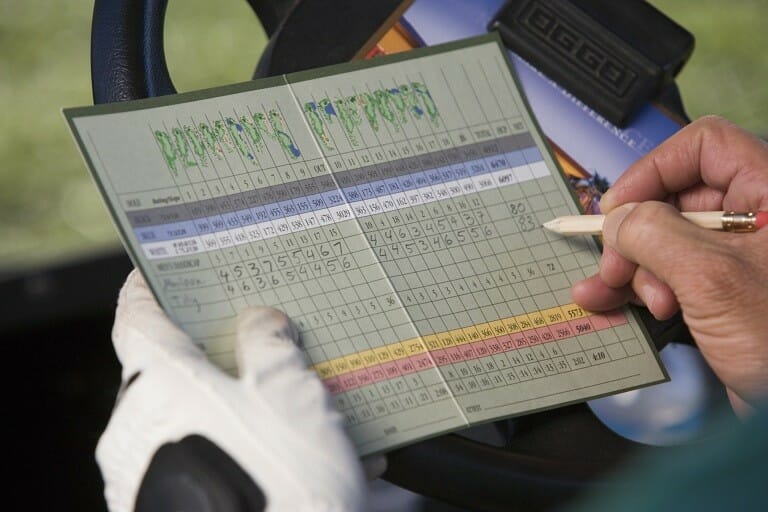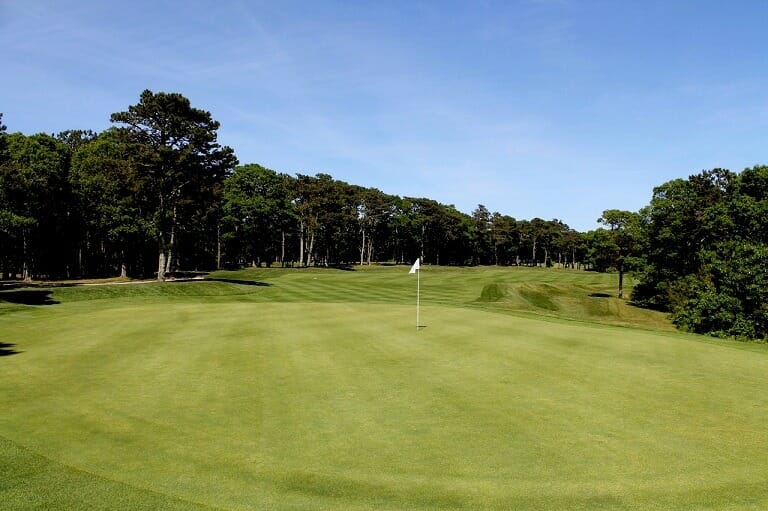Let’s talk about the matter of golf scoring. What ranks as a good and bad score? I mean how many players are actually able to break key milestones? Of 70, 80, 90, and 100? What is the average golf score for 18 holes and even 9 holes?
It’s only common to ask these questions. Because let’s face it, all players wonder how to meet the scores of professionals and even their fellow golfers. Even though you know you have to play the golf course. And not other golfers.
Whatever your reason or excuse to find out the answers. The knowledge is only going to benefit you in some way or the other. So let’s get to them right away!
But before I do anything, allow to me state something very important. I’m sure you’ve heard of the popular golfing motto. “Drive for show, putt for dough.” This particularly famous motto is not really a motto. It’s nothing but a myth after all. So you can breathe a sigh of relief.
Now let’s get straight into the topic at hand…
Average Golf Score for 18 Holes

As you might probably know that golf courses are divided into two types. The first type is one built with 18 holes. While the other consists of just 9 holes. The former is the most popular choice for intermediate and professional golfers. They always play on 18-hole golf courses.
Every round of golf on that 18-hole turf tends to stretch out, no doubt, at a lengthened distance. The extra distance of the fairway makes way for long shots. And this means testing your golfing skills.
So an average score of a golfer on an 18-hole course is 90 strokes. That suggests a total of 90 hits for completing an entire game of 18-hole golf. So the average number of shots for each hole is 5.
Average Golf Score for 9 Holes

Those playing on a 9-hole golf course want to both enjoy the game of golf and wrap it up quickly. The latter, more often than not, is due to the lack of time. Also, beginners generally play on a 9-hole golf course. And if speed is your priority, then par-3 courses are the most suitable. These are faster in comparison to 18 holes.
Needless to say, beginner and amateur golfers choose par-3 golf courses. That consists of 9 holes. And, obviously, the courses are shorter than their 18-hole counterparts. So every hole demands 3 shots maximum for reaching par.
Also, did you know that at least two holes provide you with an advantageous hole in one opportunity? This is the best news for beginners, isn’t it? After all, you can score a hole in one.
It’s not easy for beginners to grasp golfing skills during the learning or initial stages of the game. So it’s only natural for them to feel good about reaching the par-3 hole. This is what boosts their confidence levels, which is much-needed. So they can get better and eventually shift to an 18-hole golf course.
Average Golf Score by Age

Needless to say, golf scoring depends on several factors. One of them is your age. Then there’s your handicap, golfing skills, experience, etc. All these combine to affect your average score of golf. But age is an important factor, no doubt.
The average score for 18 holes…
For golfers between 7 and 10 years of age ranges from 144 to 180.
For golfers between 10 and 20 years of age ranges from 89 to 180.
For golfers between 20 and 30 years of age is 89-90.
For golfers between 30 and 40 years of age is 91-92.
For golfers between 40 and 50 years of age is 91-92.
For golfers between 50 and 60 years of age is 91.
For golfers between 60 and 70 years of age is 91.
For golfers above the age of 70 is 93-94.
As is evident, younger golfers have a very clear disadvantage. The average golf score for kids is between 144 and 180 per 18 holes. That’s about 8-10 shots per hole. In comparison to adult golfers, children play 5 strokes extra per hole. But that’s only natural since kids don’t possess the coordination and strength that the game of golf demands.
However, this changes once you get older. Meaning you start to develop a minimal average stroke.
The difference that exists between a 70 years old and 20 years old golfer is just 4 strokes for each game. That explains why senior golfers tend to choose the professional circuit for playing golf. No doubt, golfing skills, and experience are the most crucial factors that make you a good player.
What Is A Good and Bad Golf Score?

Is 103 a good golf score? What about a 120 golf score? A score that’s under 120 strokes is considered to be good. It may be higher than average. But it’s a respectable one, that’s for sure.
Let’s say you just bought a fancy golf club set. And then you set out to play a round of golf. And if you happen to achieve a score of 120. Then that’s a good one. As you practice and play more and more. It doesn’t take time to improve that score. And reach the 90-mark.
A 120 golf score or lower simply suggests that you’re scoring just 30-percent higher than any average golfer.
So now it’s only logical to assume that a bad score falls in the range of 121 and above. But if that’s your score, then you don’t have to be ashamed or embarrassed about it. The game of golf, after all, has a gradual learning curve. Just put in that extra work on the course. And you’ll fall below 120 in no time.
A bad score i.e. 121 or higher means you’re hitting 30-percent more shots for completing a single round of golf. On an 18-hole golf course. An average player takes 90 strokes. So you’re most likely taking 30-percent more strokes than that.
Conclusion
So now you know what is the average golf score for 18 holes and 9 holes. And the average golf score based on factors like age.
Just keep in mind that you should always have realistic expectations. So don’t be disappointed if your golf score is above average if you’ve just started learning the basics of golf. Be patient; you’ll eventually be able to lower your score.
Another thing to remember is an average score is only a ballpark number. Your actual score depends on several factors. Such as your handicap, age, experience level, etc.
RELATED POSTS:
- What Is the Diameter of A Golf Ball? The Best Golf Balls
- Best Ball vs Scramble – What Is the Best Golf Format?
- What Do the Numbers On A Golf Ball Mean? (All You Need to Know)
- How Long Does 18 Holes of Golf Take
- How Many Acres For A Golf Course Needed For 18 And 9 Holes
Matt Stevens is the founder of Golfrough.com. He holds a Postgraduate in Sports Marketing and has played golf since he was four years old. Having experienced every high and low golf has to offer, his writing helps the average golfer avoid the mistakes he has made in 28-years on the course.

